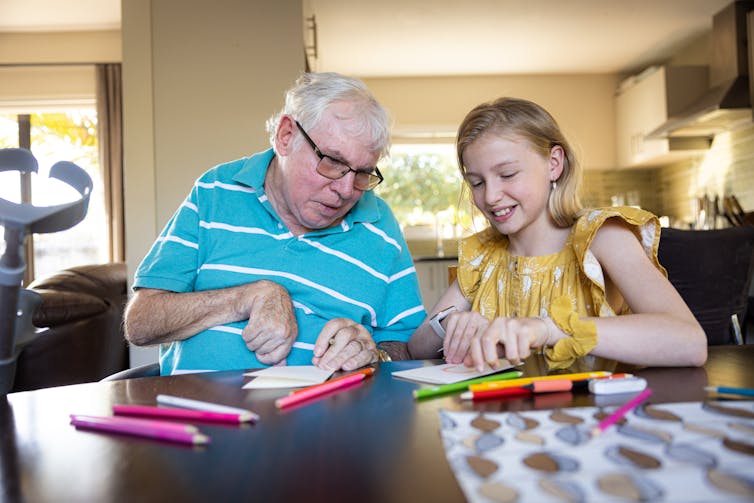How to keep dementia from robbing your loved ones of their sense of personhood – tips for caregivers
Treating people with dementia as full, thriving human beings requires awareness of stigma and simple communication strategies.

Every three seconds, someone in the world develops dementia. There are over 6 million people living with dementia in the U.S. and 57 million globally.
These figures will only increase in the coming years, as rates of dementia are predicted to double by 2060. If you don’t know someone affected by dementia, you probably will at some point.
Dementia is incredibly difficult both for the person experiencing it and for their loved ones, not only because of the symptoms of the disease but also because of the social stigma associated with cognitive decline. Experiencing stigma makes it difficult for people with dementia to ask for help, increases anxiety and depression, and ultimately leads to social isolation.
Dementia-related stigma is perpetuated through media messages that portray people with dementia as mindless and incapable, as well as through daily interactions in which others dismiss and dehumanize the person living with dementia.
These forms of invalidation – usually unintentional – accelerate and intensify the loss of self-worth and identity that dementia patients are already experiencing.
Fortunately, educating and spreading awareness can help reduce behaviors that propagate stigma and dehumanizing treatment of people with dementia.
As a social scientist and researcher in interpersonal communication and family caregiving, I explore the social and relational side of dementia. Through my work with these patients and families, I’ve learned that reducing stigma and supporting self-worth for people who have dementia is often done through daily conversations.

How is dementia defined?
Dementia is an umbrella term that refers to a family of cognitive conditions involving memory loss, difficulty thinking or processing information, changes in ability to communicate and challenges with managing daily tasks.
The most common form of dementia is Alzheimer’s disease, but there are several other forms of dementia that can severely affect a person’s quality of life and that of their loved ones.
Most forms of dementia are progressive, meaning that the symptoms of the disease get steadily worse over time. A person with dementia can live with the disease for several years, and their symptoms will shift as the disease progresses.
People in the early stages of dementia, including mild cognitive impairment, continue to engage socially and participate in many of the activities they have always done. In the middle stage of the disease, people often need more help from others to complete daily tasks and may have more difficulty holding conversations. In the late stage, people with dementia are dependent on others and often lose the ability to communicate verbally.
Despite the cognitive declines that come with dementia, people living with dementia can maintain many of their former abilities as the disease progresses. Even in the late stages, research shows that people with dementia can understand tone of voice and nonverbal communication such as body language, facial expressions and gentle touch.
This makes it clear that people with dementia can continue having meaningful social connections and a sense of self-worth even as their disease progresses.

Focusing care around the person
In the 1990s, psychologist Tom Kitwood, who studied dementia patients in long-term care settings, introduced the notion of “personhood.” Personhood is a recognition of a person’s unique experiences and individual worth. He had observed that residents with dementia were sometimes treated as objects rather than people and were dismissed as being “no longer there” mentally. In response, Kitwood advocated for a new model of person-centered care.
In contrast to the medical model of care that was standard at the time, person-centered care aims to provide people with dementia comfort, attachment, inclusion, occupation and identity.
Comfort includes both physical and psychological comfort, ensuring that the person with dementia feels safe and is as pain-free as possible. Attachment and inclusion have to do with supporting a person with dementia’s closest relationships and making sure they feel included in social activities.
Occupation is about giving the person meaningful activities that are suited to their abilities, while identity is about preserving their unique sense of self. According to Kitwood, each of these elements of personhood can be upheld or threatened through a person’s interactions with others.
I find Kitwood’s work particularly important because it suggests that communication is at the heart of personhood.
Communicating to support personhood
So how can family members and friends communicate with their loved one with dementia to help preserve their sense of self?
Researchers have identified several evidence-based communication strategies that support person-centered care both in long-term care settings and within the family.
These include:
Arranging the environment to support conversation. Have conversations in a quiet place with as few distractions as possible, sit at eye level and close to the person, make eye contact and use gestures to reinforce what you say.
Acknowledging the person with dementia as a unique individual. Helping your loved one remember who they were before dementia is critical to supporting their sense of self-worth. In long-term care, this is done by greeting them, calling them by name and integrating their past experiences into conversations. In families, it is done by inviting the person to reminisce about their past or reminiscing together and by talking about their accomplishments and admirable qualities.
Affirming and validating the person’s emotions. Even if you don’t understand what the person is thinking or feeling, avoid correcting them and instead acknowledge their underlying emotion.
Seeking the person’s input about their care. This includes asking about their preferences for food or activities, usually using simple “yes” or “no” questions, and asking their permission before helping them with physical care such as bathing, moving or changing clothes.
Using simple prompts to help the person successfully engage in conversation. This can be done through repeating or rephrasing questions, paraphrasing the person’s responses, pausing to give the person time to think, and providing simple prompts to help the person remember.
Creating and maintaining connection. In families, this is done by giving a hug or kiss or saying “I love you”; doing activities together such as playing simple games, making art or playing music; and joking around and laughing together.
Communication shifts as the disease progresses
Supporting personhood requires adjusting to the communication abilities of the person with dementia. Some communication strategies are helpful in one stage of the disease but not in others.
In a recent study, my team and I found that asking the person with dementia to recall the past was affirming for those who were early in the disease and who could still recall the past. But for people who were in later stages of the disease, asking them “Do you remember?” was received more like a test of memory and led to frustration or confusion. Similarly, we found that suggesting words to prompt recall was helpful later in the disease but demeaning for people who were in earlier stages of the disease who could still find their words without help.
Providing more help in conversation than is needed can lead people with dementia to withdraw, whereas appropriately adjusting to a person’s communication abilities can empower them to continue to engage socially.
Ultimately, supporting a person with dementia’s sense of self and self-worth in conversations is about finding a communication sweet spot – in other words, matching your approach to their current capabilities.
Changing your default approach to conversations can be challenging, but making simple communication changes can make all the difference. Meaningful conversations are the key to helping your loved one live their days to the fullest, with a sense of personal worth and a feeling of meaningful connection with others.
R. Amanda Cooper is affiliated with the Alzheimer's Association as a Community Educator.
Read These Next
There aren’t enough geriatricians – here’s how older adults can still get the right care
A few simple strategies can help older adults convey their needs to their health care provider.
How natural hydrogen, hiding deep in the Earth, could serve as a new energy source
Hydrogen demand around the world is projected to grow significantly by 2050. Some of that supply could…
The apocrypha, Christianity’s ‘hidden’ texts, may not be in the Bible – but they have shaped traditi
‘Apocrypha’ means ‘hidden’ in Greek, but it is often used to describe texts that are outside…






